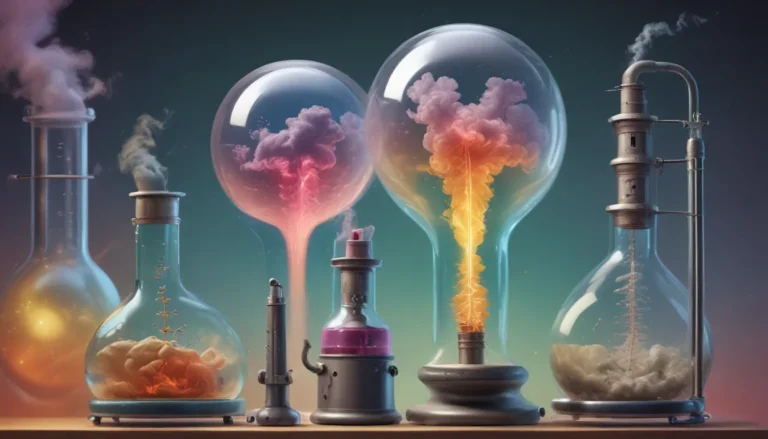A Note About Images: The images used in our articles are for illustration purposes only and may not exactly match the content. They are meant to engage readers, but the text should be relied upon for accurate information.
Energy is an essential aspect of our daily lives, powering our homes, vehicles, and technological innovations. However, beyond its basic concept lies a realm of fascinating facts that unveil the intricate relationship between energy and the universe. In this article, we will delve into 14 surprising facts about energy that will leave you in awe and hungry for more knowledge. So, buckle up and prepare to embark on a journey through the captivating world of energy.
Understanding the Law of Conservation of Energy
The law of conservation of energy is a fundamental principle in physics. It states that energy cannot be created or destroyed but can only be transformed from one form to another. This law highlights the constant total amount of energy in a closed system, emphasizing the importance of efficient energy use and conservation.
Tracing Energy Back to the Sun
The sun serves as the ultimate source of almost all forms of energy on Earth. Whether it is heat, light, or wind, the energy we rely on can be traced back to the sun. Various processes, such as solar panels, photosynthesis, and the formation of fossil fuels from ancient sunlight, harness the sun’s energy to power our daily activities.
Unraveling the Origins of Fossil Fuels
Fossil fuels, including coal, oil, and natural gas, are derived from the remains of plants and animals that existed millions of years ago. The Earth’s crust’s pressure and heat over time transformed these organic materials into the carbon-rich fossil fuels we heavily rely on today for energy production.
Harnessing Nuclear Power through Nuclear Fission
Nuclear power plants generate electricity through nuclear fission, where atomic nuclei are split to release a significant amount of energy. This process is controlled to produce electricity, showcasing nuclear power as a potent energy source with vast potential for electricity generation.
Embracing Renewable Energy Sources
The shift towards utilizing renewable energy sources, such as solar, wind, and hydro power, is gaining momentum due to concerns about climate change and finite fossil fuel resources. These sustainable energy sources offer a minimal environmental impact compared to traditional fossil fuels, driving the transition to a greener energy mix.
Exploring Diverse Forms of Energy Storage
Energy can be stored in various forms to balance supply and demand efficiently. Batteries store electrical energy, while technologies like compressed air and pumped hydro storage systems store mechanical energy. These energy storage solutions play a crucial role in optimizing energy usage and ensuring a reliable energy supply.
Discovering the World’s Largest Solar Power Plant
The Ivanpah Solar Power Facility in California’s Mojave Desert stands as the world’s largest solar power plant. Covering over 3,500 acres, this facility harnesses sunlight by focusing it onto power towers to generate steam, which in turn drives turbines to produce electricity.
Tapping into Geothermal Energy
Geothermal energy utilizes the Earth’s natural heat from within by extracting heat through deep drilling into the Earth’s crust. This heat is converted into usable energy, typically in the form of electricity or heating and cooling systems. Geothermal power plants in areas with high geothermal activity, like Iceland and the Philippines, demonstrate the potential of this renewable energy source.
Tracing the Ancient Roots of Energy Concepts
The concept of energy traces back to ancient Greek philosophy, where thinkers like Aristotle and Archimedes pondered the principles of energy and its various forms. Although the concept has evolved over centuries, thorough studies in the 19th century led to the formulation of the laws of thermodynamics that shape our understanding of energy today.
Embracing Energy Efficiency for Sustainability
Improving energy efficiency through practices like using energy-efficient appliances, insulating buildings, and adopting sustainable habits is crucial in reducing energy consumption and its environmental impact. These efforts play a significant role in promoting sustainability and mitigating energy-related challenges.
Addressing Global Greenhouse Gas Emissions
The energy sector significantly contributes to global greenhouse gas emissions through the production and consumption of energy, primarily from burning fossil fuels. Transitioning to cleaner and more sustainable energy sources is imperative to combatting climate change and promoting a healthier environment.
Harnessing Ocean Tides and Waves for Energy
Renewable energy technologies like tidal and wave power harness the energy from ocean tides and waves to generate electricity. Coastal regions with strong tidal currents and consistent wave activity offer immense potential for utilizing these renewable energy sources to meet electricity demands sustainably.
Embracing Innovation for a Sustainable Future
As our energy demands grow, embracing innovative technologies and sustainable practices becomes essential. Advancements in solar and wind power, coupled with the electrification of transport, exemplify the evolving energy landscape geared towards meeting the challenges of a rapidly changing world.
Conclusion: Unlocking the Mysteries of Energy
In conclusion, energy stands as a captivating and indispensable force in shaping our world. From its origins in the universe to its transformative potential in our daily lives, energy plays a monumental role in driving progress and sustainability. By exploring the surprising facts about energy and embracing renewable sources and energy efficiency, we pave the way for a greener and more sustainable future.
FAQs: Unveiling Energy Insights
-
Q: What is energy?
A: Energy is the capacity to do work or produce heat, existing in various forms like kinetic, potential, thermal, and chemical. -
Q: Where does energy come from?
A: Energy sources vary from fossil fuels and renewable sources like wind, solar, hydroelectric power, nuclear reactions, and even food consumption. -
Q: What is the significance of renewable energy?
A: Renewable energy sources offer sustainability, minimal environmental impact, reduced reliance on fossil fuels, and contribute to combating climate change. -
Q: How does nuclear energy work?
A: Nuclear energy is generated through nuclear reactions, where atomic nuclei split (nuclear fission) or fuse (nuclear fusion), releasing immense energy. -
Q: What is dark energy?
A: Dark energy is a hypothetical form believed to constitute a significant portion of the universe, contributing to its expansion. -
Q: How can we conserve energy?
A: Energy conservation involves adopting energy-efficient practices like using LED bulbs, insulating buildings, utilizing public transportation, and turning off appliances when not in use.
Dive deeper into the fascinating world of energy by exploring captivating articles on topics like biomass, TotalEnergies’ industry influence, and Power Ledger’s innovative energy trading platform. As we continue to unlock the secrets of energy, let’s embark on a journey of exploration and discovery, paving the way for a sustainable and thriving future.






